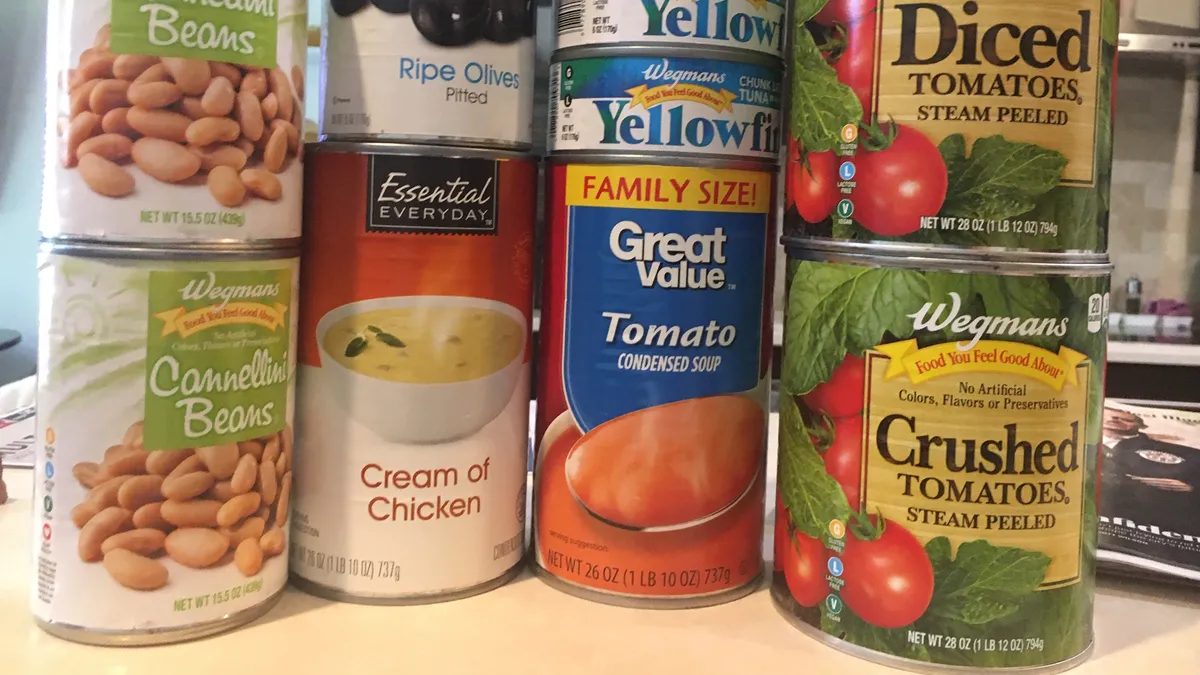Dive Brief:
- The number of products introduced by private label brands has outpaced those from national CPG brands during the pandemic, according to a study from shopper intelligence firm Catalina.
- While the number of product introductions has fallen in both categories during the first two years of COVID-19, the drop was much less severe for private label. Compared to 2019, the category introduced 34% fewer products in 2020 and 54% fewer products in 2021. For national CPG brands, there were 46% fewer new UPCs in 2020 and a drop of 65% in 2021, respectively, compared to 2019.
- Private label brands have struggled during much of the pandemic as consumers turned to familiar big name offerings, but store brands are becoming more attractive to shoppers amid a sweeping increase in food prices.
Dive Insight:
As the pandemic unfolded, many analysts expected private label to be a major beneficiary as homebound consumers looked for ways to save money. But in 2020, for the first time in a decade, sales growth of national brands outpaced the growth of private labels, according to NielsenIQ data.
Krishnakumar Davey, president of strategic analytics at IRI, told sister publication Food Dive last year that private label brands were hit harder than their brand name peers by supply chain issues in areas such as transportation. It's also possible brand name manufacturers prioritized making their own higher-margin products instead of private label offerings.
At the same time, consumers who backed off traveling, commuting to work or grabbing a coffee on the way to the office had more cash to spend, meaning private label wasn't as necessary for their budgets.
Retailers and food manufacturers have prioritized keeping shelves stocked during COVID-19, meaning there was less incentive to switch to new brands during such a tumultuous time. But despite the headwinds, private label makers haven't slowed down their pace of innovation, at least compared to bigger-name rivals.
Last year, the Food Industry Association said private label was seeing continued investments within the food industry, with 91% of surveyed food retailers and manufacturers planning to significantly or moderately ramp up their private label efforts in the next two years. The survey also found that 58% of companies are adding new offerings focused on innovation.
Private brand innovation has focused on specific categories like cookies and cereal, Catalina said, leaning into the consumer's interest in snacking and the fact that more breakfast is being consumed at home during the outbreak.
The Catalina study found the ready-to-eat cereal category, for example, saw a 48% decrease in new product introductions for private brands versus a 53% decrease for national brands in 2020 compared to the same period in 2019. But in 2021, new product introductions for private brands surged by 66% while national brand launches declined by 35%. Similar trends were reported in cookies, too.
"Overall, retailers are seeking to engage shoppers who may once again be turning to private brands," Phyllis Johnson, senior director of private brand development at Catalina, said in a statement. "This could be a second chance for those retailers to effectively demonstrate the value of private brands and convert shoppers to loyal private brand buyers."
Once viewed as having inferior quality, private label has made inroads to make itself more competitive with name brands. By outpacing the level of innovation compared to national brands during the pandemic, they could position themselves in a more favorable position in the current economic landscape. Rob Vitale, president and CEO of Post Holdings, told analysts in late November that he observed "some uptick" in private label during the previous eight weeks.
Unlike earlier in the pandemic, consumers are venturing outside of the home more and once robust cash stockpiles have been drawn down. At the same time, supply chain disruptions, labor shortages and inflation have caused food manufacturers to increase prices. Together, these could make cheaper private label offerings more attractive for retailers and cash-strapped consumers, especially if the quality of the products and level of innovation fits with what shoppers are looking for.
With shoppers concerned about inflation, Johnson said private brands are reinforcing quality and value in key categories while the price differential with some national brands is shrinking.














